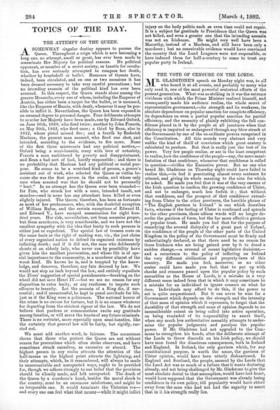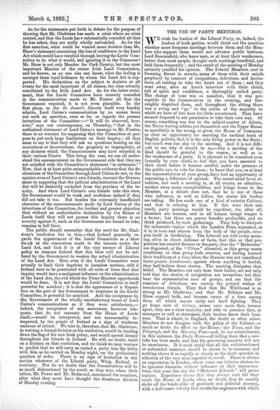THE VOTE OF CENSURE ON THE LORDS.
MR. GLADSTONE'S speech on Monday night was, to all who heard it at all events, and probably to many who only read it, one of the most powerful oratorical efforts of the present generation. What was so striking in it was the extreme vividness with which the Prime Minister realised himself, and consequently made his audience realise, the whole secret of representative government,—its strength and its weakness, its absolute dependence on popular sanction for complete efficiency, its dependence on even a partial popular sanction for partial efficiency, and the necessity of plainly exhibiting the fall con- fidence placed in it by the people at all junctures when that efficiency is impaired or endangered through any blow struck at the Government by one of the co-ordinate powers recognised in the Constitution. All this sounds very abstract and very unlike the kind of thrill of conviction which great oratory is calculated to produce. But that is really just the test of its power. Very few people realise, or are in the least competent to realise, how the confidence of the people—nay, the mere mani- festation of that confidence, whenever that confidence is called in question—vivifies the Executive power. But no one who heard Mr. Gladstone on Thursday night could have failed to realise this,—to feel it penetrating almost every sentence he uttered, and giving its whole meaning to the vita for which he asked. He made you feel that it was of the very essence of the Irish question to confirm the growing confidence of Ulster, and not to endanger, much less forfeit it ; • that without that confidence, and the prospect of that confidence extend- ing from Ulster to the other provinces, the horrible phrase of "The. English garrison in Ireland" is one which describes facts, whereas if the feeling of Ulster is confirmed and spreads to the other provinces, those odious words will no longer de- scribe the garrison of force, but the far more effective garrison of popular trust. He made you feel that for the purpose of remedying the avowed disloyalty of a great part of Ireland, the confidence of the people of the other parts of the United Kingdom in the policy of the Government must be firmly and unhesitatingly declared, so that there need be no reason for those Irishmen who are being gained over by it to dread a sudden change,—a reversal of recent legislative decisions,— and a recurrence to the policy of inflicting on Ireland the very different civilisation and property-laws of this country. He made you feel, moreover, as no other orator could have made you feel, that to put up with checks and censures passed upon the popular policy by such assemblies as the House of Lords, is a mistake in a very different sense indeed from that in which it may sometimes be a mistake for an individual to ignore censure on what he does. Individuals may afford to do this, if the power to act is quite unquestioned. But it can never be wise for a Government which depends on the strength and the intensity of that mass of opinion which it represents, to forget that the durability of that strength and mass of opinion depends to no inconsiderable extent on being called into active operation, on being reminded of its responsibility to assert itself, when any much less authoritative assembly attempts to under- mine the popular judgments and paralyse the popular power. If Mr. Gladstone had not appealed to the Com- mons to strengthen his hands, after the deliberate attempt of the Lords to throw discredit on his Irish policy, we should have soon found the disastrous consequences, both in Ireland and England. In Ireland, the only garrison which, for any constitutional purpose, is worth the name, the garrison of Ulster opinion, would have been utterly disheartened. In England and Scotland, the people, assured by the Lords that the Land Act was so much of a failure that it wants doctoring already, and not being challenged by Mr. Gladstone to give the most absolute denial to that assumption, would have lost heart, would have supposed that the Government was already losing confidence in its own policy, till popularity would have ebbed away from the man who had not had the sagacity to assert that in it his strength really lies.
As for the statements put forth in debate for the purpose of showing that Mr. Gladstone has made a crisis where no crisis existed, and that the Lords have substantially conceded all that he has asked, they are really wholly unfounded. As for the first assertion, what could be wanted more decisive than Mr. Shaw's statement concerning the loss of confidence in the Land Act which would have resulted through leaving the Lords' Com- mittee to do what it would, and ignoring it in the Commons? Mr. Shaw is not only Member for Cork County, but the most important Member of the recent Irish Land Commission, and he knows, as no one else can know, what the feeling is amongst those loyal Irishmen by whom the Land Act is sup-
ported. His declaration on the subject is decisive at all events for the most important of all classes, the class actually conciliated by the Irish Land Act. As for the latter state- ment, that the Lords' Committee have recently conceded in the communication made to Mr. Forster all that the Government required, it is not even plausible. In the first place, as the St. James's Gazette itself very frankly admits, Lord Cairns's communication by no means bears out such an assertion, even so far as regards the present intentions of the Committee :—" It will be observed, how- ever," says our contemporary, on Thursday, " that in the authorised statement of Lord Caims's message to Mr. Forster, there is no warrant for supposing that the Committee do pro- pose to put such large limitations on their inquiry ; all they seem to say is that they will ask no questions bearing on the correctness or incorrectness, the propriety or impropriety, of any decision which the Commissioners may have recorded in their various Courts. This being the case, we can all under- stand the announcement on the Government side that they are not satisfied with the Committee's statement ' in substance." Now, that is at least quite unimpeachable evidence that the de- clarations of the Committee through Lord Cairns do not, in the opinion even of Lord Cairns's own friends, warrant the Govern- ment in supposing that the judicial administration of the Land Act will be distinctly excluded from the province of the in- quiry. And when Lord Cairns's own friends take this view, the Government would be weak and credulous indeed if they did not take it too. But besides the extremely insufficient character of the announcements made by Lord Cairns of the intentions of the Committee, the further and greater objection that without an authoritative declaration by the House of Lords itself they will not pursue this inquiry there is no security against it, such as the Government are bound to take, remains in full force.
The public should remember that the need for Mr. Glad- stone's resolution lies in this,—that Ireland generally re- gards the appointment of the Lords' Committee as a blow strack at the concessions made to the tenants under the Land Act, and that it is of the very essence of Liberal policy to reassure Ireland that this blow will not be suf- fered by the Government to weaken the actual administration of the Land Act. Now, even if the Lords' Committee were actually to limit their inquiries to harmless matters, still if Ireland were to be penetrated with all sorts of fears that that inquiry would have a malignant influence on the administration of the Land Act, the evil which the Prime Minister apprehends would be done. It is not that the Lords' Committee is itself powerful for mischief ; it is that the appearance of a disposi- tion on the part of the Government to acquiesce in the Lords' Committee, is powerful for mischief. And the acceptance by the Government of the wholly unsatisfactory terms of Lord
Cairns's communications as if they were satisfactory,—
indeed, the acceptance of any assurances, however ade- quate, that do not emanate from the House of Lords itself,—would be interpreted, and not unreasonably in- terpreted, by the people of Ireland as a sign of weakness ominous of retreat. We take it, therefore, that Mr. Gladstone, in waiving a formal division on his resolution, would be hauling down the flag of his new Irish policy, and would spread dismay throughout his friends in Ireland. He will, no doubt, insist on a division on that resolution, and we think we may venture to predict that he will carry as united a party into the lobby with him as he carried on Monday night, on the preliminary question of order. There is no sign of hesitation in any section whatever of the Liberal party, Whig, Radical, or crotchety. Nor do we doubt that the Conservatives will be as much disheartened by the result as they were when their tellers, Mr. Power and Mr. Redmand, announced the numbers, after what they must have thought the disastrous division of Monday evening.



































 Previous page
Previous page